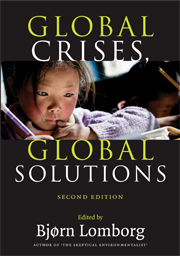Expert panel ranking
Published online by Cambridge University Press: 05 June 2012
Summary
The Goal of the Project
The goal of Copenhagen Consensus 2008 project was to set priorities among a series of proposals for confronting ten great global challenges: Air pollution, Conflicts, Diseases, Education, Global Warming, Malnutrition and Hunger, Sanitation and Water, Subsidies and Trade Barriers, Terrorism, and Women and Development.
Ranking the Proposals
A Panel of economic experts, comprising eight of the world's most distinguished economists, was invited to consider these issues. The Panel members were: Jagdish N. Bhagwati of Columbia University, Franois Bourguignon of Paris School of Economics and former World Bank chief economist, Finn E. Kydland of University of California, Santa Barbara (Nobel laureate), Robert Mundell of Columbia University in New York (Nobel laureate), Douglass C. North of Washington University in St. Louis (Nobel laureate), Thomas C. Schelling of University of Maryland (Nobel laureate), Vernon L. Smith of Chapman University (Nobel laureate), and Nancy L. Stokey of University of Chicago.
The Panel was asked to address the ten challenge areas and to answer the question: “What would be the best ways of advancing global welfare, and particularly the welfare of the developing countries, illustrated by supposing that an additional $75 billion of resources were at their disposal over a four-year initial period?”
Ten Challenge papers, commissioned from acknowledged authorities in each area of policy (chapters 1–10 in this volume), set out more than thirty proposals for the Panel's consideration. During the week-long conference, the Panel examined these proposals in detail.
- Type
- Chapter
- Information
- Global Crises, Global SolutionsCosts and Benefits, pp. 657 - 679Publisher: Cambridge University PressPrint publication year: 2009
- 2
- Cited by



